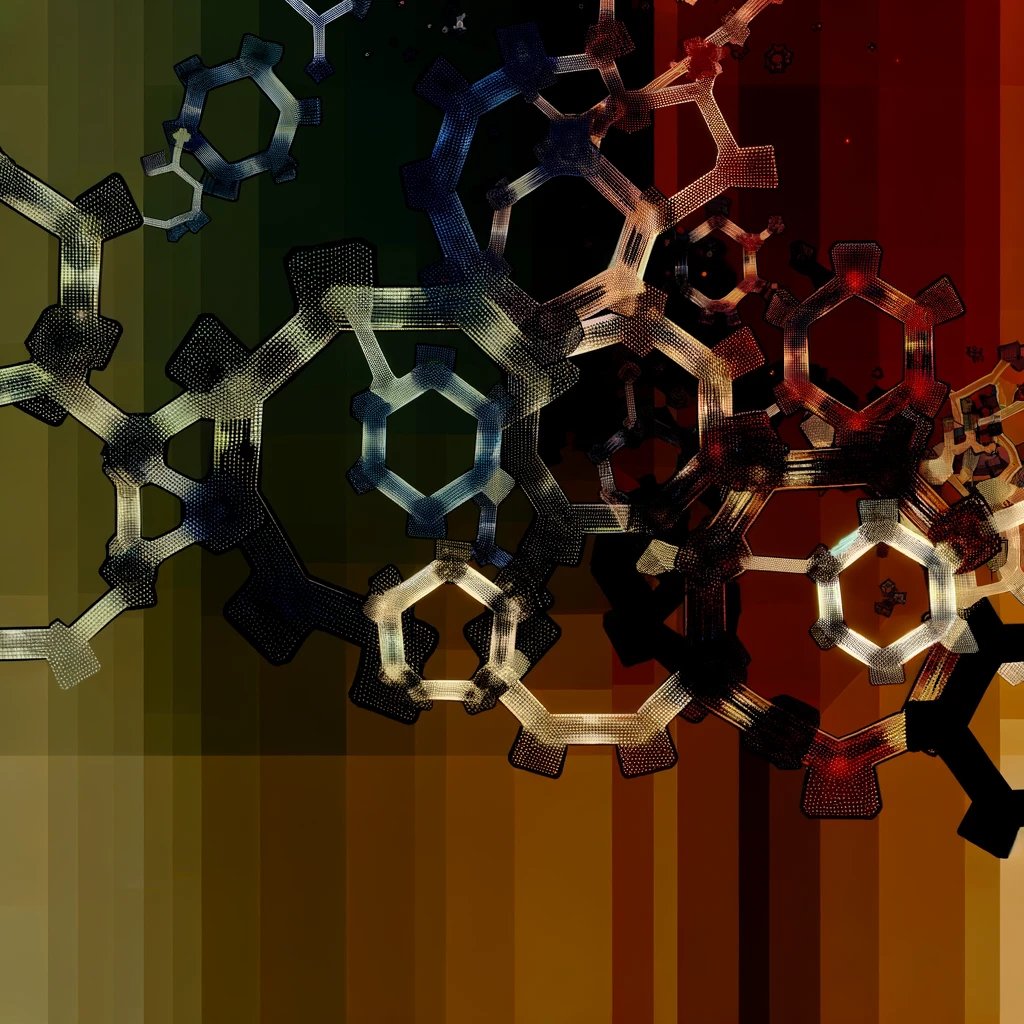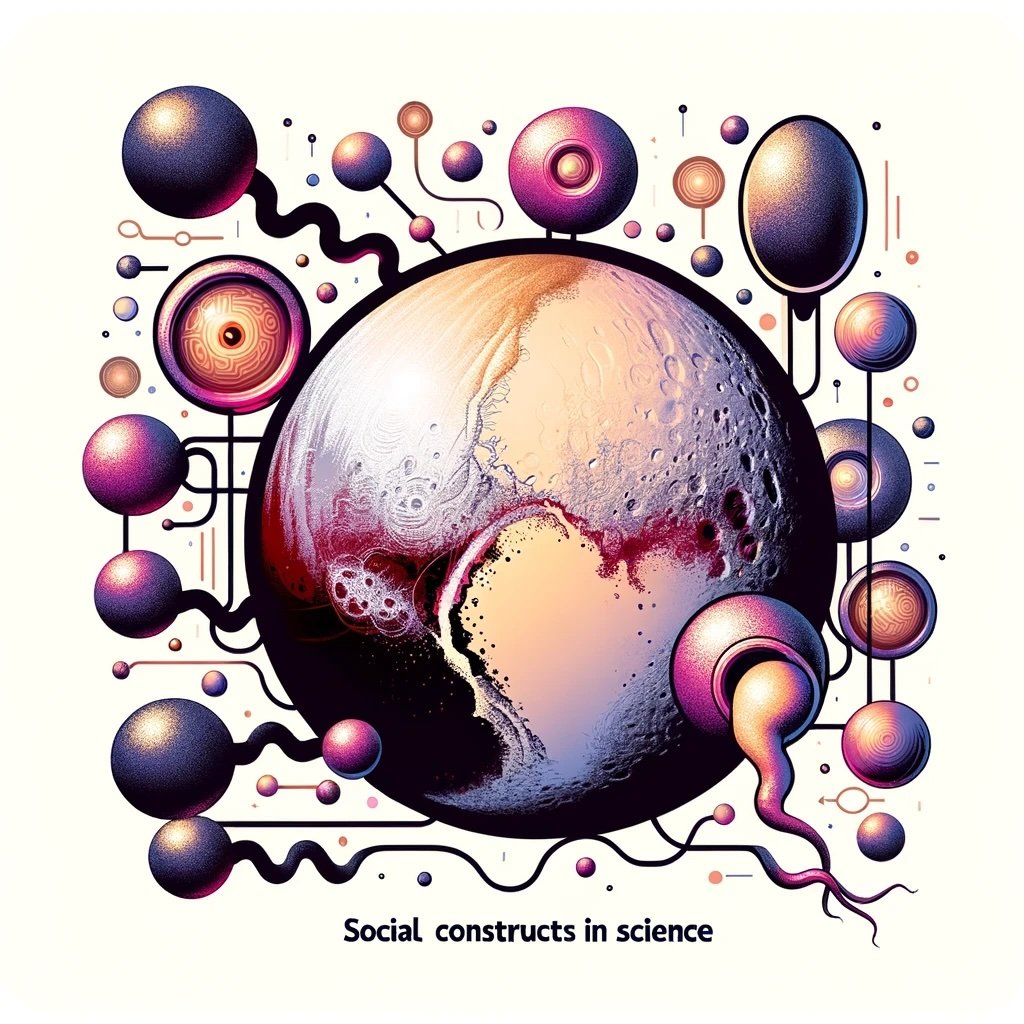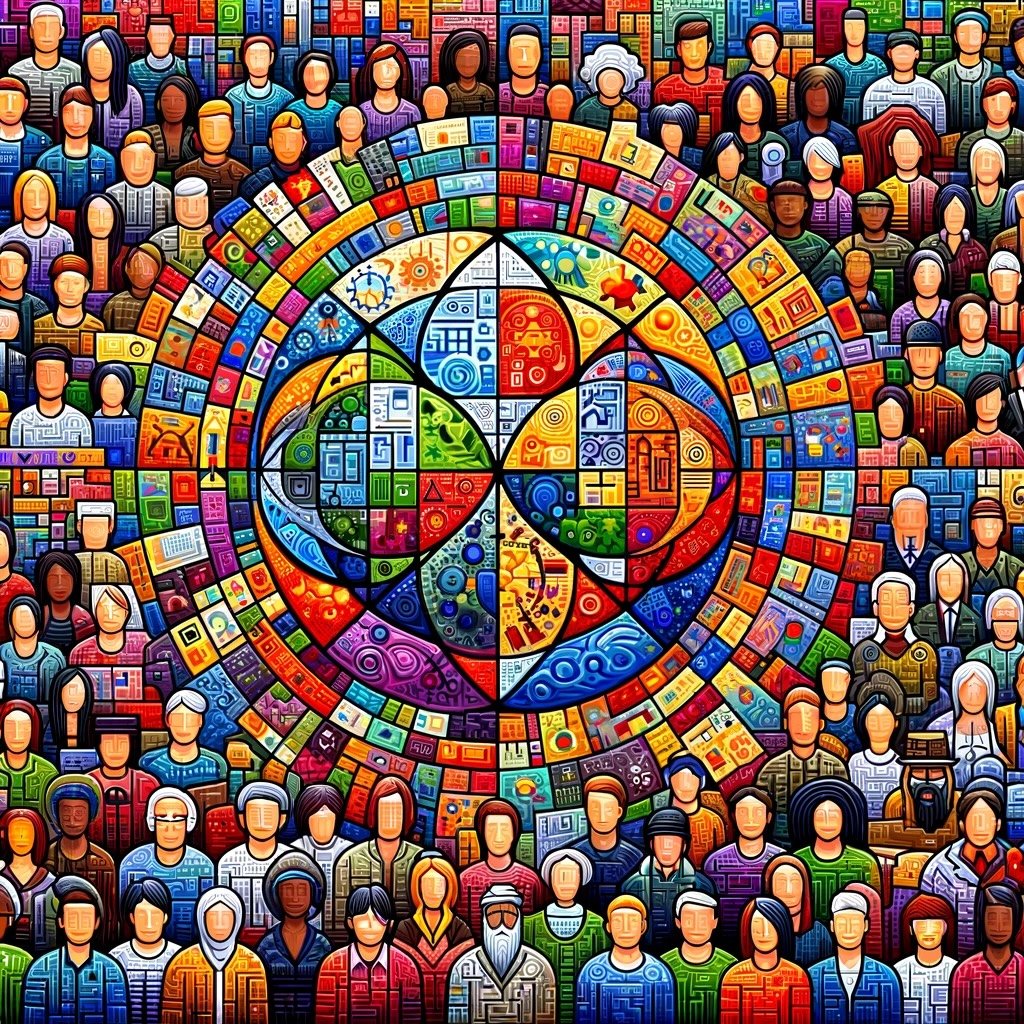Welcome to my blog!
Every morning, I begin with a cup of coffee and 15 minutes of free thinking. I write down everything that comes to mind, from new ideas to thoughts that emerged overnight. This is where I develop and refine my new research. You'll find some repetition and ideas still in progress. Some might seem unusual or unclear at first, but that's part of the journey! I'm excited to share how my ideas form and evolve.
From Explosion to Trivialisation: Rethinking Logical Standards
This blog post discusses the rule of explosion in logic, which posits that from any contradiction, everything follows—resulting in what is known as triviality. I explore the limitations of this principle and introduce a nuanced approach termed 'trivialisation' that seeks to redefine how we measure coherence without insisting on strict consistency.
Explosion is the logical rule stating that from any contradiction, anything follows. This principle turns contradictions into potentially catastrophic events because if encountered, they render every proposition true. The only logical system where everything is true is known as the Trivial theory. If this theory holds, inquiry ceases, because every statement you make is true. For example, both "There is a Sun" and "There is no Sun" would be true. The implications stretch to any declaration: "The world is a fiction" and "The world is real" would simultaneously hold true, as would the notion that a sudden billion-dollar increase in your bank account could justify quitting your job. Clearly, triviality is bad.
Debates among logicians about the true nature of logic, its rules, and whether multiple logics exist are ongoing, but all agree that triviality is unacceptable. The rule of explosion is generally applied negatively in logical practice; its primary use is to prevent the derivation of contradictions because if one does arise—boom—everything becomes true.
In mathematics, the rule of explosion is pragmatic. Mathematical research often involves setting foundational principles and deriving results without contradiction. However, as I discuss in Logic in the Wild, specifically in the section "Logic in the Weird," with explosion logic becomes ineffective in scenarios that are weird or absurd. Even the concept of truth can appear contradictory, and simple logical arguments can demonstrate this paradox. To counteract these issues, logicians have concocted theoretical monsters—complex constructs they claim enhance our understanding of truth, though often in ways that are ad hoc and arbitrary.
A more progressive approach is to abandon the rule of explosion and accept some contradictions as inevitable. This leads to the notion of "trivialisation," a broader principle I propose, which infers that everything follows from incoherence. If logic, serving as the guardian of coherence, fails, then incoherence ensues, which is detrimental. While twentieth-century logicians obsessed on reducing trivialisation to explosion, the new millennium is seeing a shift towards a more tolerant perspective.
One challenging aspect remains: how do we measure incoherence if inconsistency alone is insufficient? Ensuring coherence without enforcing strict consistency is a complex but essential task, particularly within community settings where overly stringent logical standards can trivialise diverse viewpoints. This issue underscores the need for a reevaluation of how we apply logical principles to ensure they enhance rather than stifle discourse.
Logic as an Epistemic Tool
This blog post explores the role of logic as an epistemic tool, clarifying that while it does not directly determine truth, it is crucial in structuring knowledge. The discussion also touches on the concept of epistemic injustice and how denying logical tools can perpetuate systemic biases.
What might it mean to say that logic is an epistemic tool? A straightforward response is that it helps in the production of knowledge. However, this doesn't imply that logic determines what is true or false. In Logic in the Wild, I address the “Why not truth?” question, which challenges the relevance of logic if it cannot definitively adjudicate truth. If something is known to be false, why entertain logical arguments supporting it? And if the truth of the reasons supporting a belief is uncertain, why invest time in logical analysis?
These are pertinent questions, yet posing them does not render them unanswerable. Realizing the true function of adopting a logical mindset reveals why such questions themselves can obstruct informed reasoning, particularly within a community. Returning to our initial inquiry: how does logic function as a tool in knowledge production if it does not generate knowledge itself? One part of the answer is that while logic alone does not suffice to produce knowledge, it is sometimes necessary for it. You can have arguments that contain only true content but lack logical coherence, thereby failing to secure genuine knowledge. Thus, logic's contribution is that it is necessary to facilitate knowledge production.
This topic became particularly salient to me while extensively reading the literature on "epistemic injustice," which describes how such injustice wrongs individuals in their capacity as knowers. One form of epistemic injustice, as frequently discussed, involves denying access to shared epistemic tools. Although these discussions are prevalent, the precise definition of what constitutes an epistemic tool still invites further exploration. It's obvious to me that logic is one such tool that has historically been withheld, a practice with profound historical and cultural implications. Aristotle, for example, perpetuated the notion that women are not logical but emotional, reinforcing a patriarchal dichotomy between emotion and logic, male and female. Recognizing logic as an epistemic tool sheds light on how its denial has contributed to systemic epistemic injustice, particularly against women. This perspective invites a deeper understanding of logic not just as a theoretical framework but as a practical necessity in challenging and overcoming these ingrained injustices.
Conceptual or Logical Choice?
This blog post explores the intricate relationship between logical and conceptual choices, questioning whether decisions based solely on definitions can exist independently of logical connections, and how logic imposes boundaries on conceptual behavior.
When is choosing a concept actually a logical choice? To elucidate this question, consider the difference between sympathy and empathy in a scenario where you need to select the appropriate term but aren't initially sure which fits best. Understanding the definitions and distinctions between these two concepts might help you decide which word you need. In such cases, you might argue that the choice is purely conceptual, driven entirely by definitions and meanings.
However, is a purely conceptual decision ever truly possible? Concepts don't exist in isolation; they interact with other concepts much like updating your beliefs about the world when you receive new information. Such updates rarely occur in isolation since our beliefs are interconnected logically. While we may be guided by a choice of concepts rooted in conceptual understanding, logic plays a crucial role in determining the ripple effects within the conceptual network.
I propose that there exists a deeper conceptualization that is fundamentally a logical choice. At its core, logic functions by setting boundaries on how concepts behave. For example, can a concept and its opposite overlap? Employing strict logical standards of consistency, logic acts as a guardian to prevent contradictions, such as ensuring that "male" cannot be "female," "red" is not "green," or "true" is not "false."
This logical insistence on avoiding contradiction dictates our approaches to managing these issues, sometimes leading to the creation of theoretical monsters, which I call "mailboxes" in Logic in the Wild—you’ll have to read it to find out why!y. Unless there is a shift in logical standards, one cannot freely begin to work with concepts that might overlap with their opposites. What might initially appear as a conceptual choice to employ a "different" notion of truth under a contradiction-tolerant logic is, in reality, not a conceptual choice but a logical one. The definitions and meanings of the concept, and the applications of those concepts, remain constant, but the underlying logic must adapt to accommodate them. This interplay highlights the profound influence of logical structures on our conceptual engagements, inviting us to reconsider how deeply intertwined logic and conceptualization truly are in shaping our understanding and communication.
The Role of Explosion in Logic
This blog post discusses the principle of explosion in logic, exploring how it traditionally mandates that any contradiction leads to everything becoming true, and why some modern logicians choose to reject this rule to handle inevitable contradictions more gracefully.
Explosion is a fundamental rule in logic that stipulates inconsistency leads to triviality. When a contradiction occurs, no matter the context, everything theoretically becomes true. In logical systems that adhere to explosion, the rule isn't so much a tool to be used as a warning to avoid contradictions. For instance, if you want to prove something as absurd as "I'm a donkey," you could start by asserting a contradiction like "the Moon is and isn't made of green jelly." Once you've established this contradiction, technically, everything becomes true—including the statement about being a donkey. Of course, I hope to have not convinced you of such nonsense!
In systems governed by explosion, while such arguments are valid, they aren't sound because the premises (like the Moon’s contradictory composition) cannot all be true. The real utility of explosion is evident in mathematical reasoning, which relies on assumptions and definitions. Here, it’s crucial that first principles not only support the theorems (like the Pythagorean theorem) but also ensure that no contradictions can be proven. Securing this guarantees the reliability of mathematical foundations, a major focus of foundational studies in the 20th century.
However, the rule of explosion is not without its critics. Why reject such a rule? Some contradictions seem inevitable. In Logic in the Wild, I refer to these as "insolubles," a term borrowed from medieval logicians to describe statements that entail their opposites, such as the Liar Paradox ("This sentence is false."). These insolubles present contradictions that could trivialize all logical reasoning if taken to the extreme with explosion.
In response, some modern logicians have moderated their stance, opting to work without the rule of explosion. Contrary to what might seem like an abandonment of rigorous logical foundations, this approach does not end the inquiry but rather complicates it. Bo logician wants triviality, and if all contradictions are true, then everything is true. That would be bad! The challenge lies in distinguishing between good and bad contradictions. For example, a statement like "The Moon is and isn’t made of blue cheese" is nonsensical and clearly problematic. However, the Liar sentence represents a tolerable contradiction because it is an insoluble.
This discussion leads to an intriguing question: if inconsistency isn't the logical measure of triviality, what is? Can we formulate a rule like explosion that accommodates inconsistency yet still flags incoherence as trivializing? In the terms of Logic in the Wild, this would translate to something like "Incoherence entails triviality." But not all cases of incoherence are so severe as to warrant every conceivable conclusion. What are your thoughts on refining our understanding of logical boundaries to better handle the nuances of real-world reasoning?
Symbolism, Essentialism, and Universalism: The Mechanics of Exclusion
I explore the reasoning patterns of symbolism, essentialism, and universalism in critical theories like feminism, highlighting how they can perpetuate intersectional exclusions and marginalize diverse groups even further.
In today's discussion, I want to discuss reasoning patterns that contribute to intersectional concerns. These concerns arise when the critical theory representing an oppressed group fails to encompass all members of that group. A classic example is how feminism, often led by white European cis straight women, is generalized to represent a universal voice for all women. However, what might seem like a rebalancing of power for white women does not necessarily address the additional axes of oppression faced by women of color, members of the rainbow community including trans women, women of different religions, and those living in societies with varying gender roles and structures.
Commonly, issues of intersectionality are discussed in terms of those who are excluded or further marginalized by theories purported to be universal. My approach this morning, however, takes a different angle. Instead of focusing on the excluded, I want to analyze the reasoning patterns that perpetuate this exclusion. While my examples will primarily pertain to feminism, similar patterns can be observed across other critical theories.
The reasoning patterns I am concerned with include symbolism, essentialism, and universalism. Symbolism in feminism manifests as gender symbolism, which involves ascribing sexual attributes to inanimate objects. This might sound vague, but let's consider some standard examples: blue is deemed masculine, pink feminine; beer is considered masculine, while cocktails are feminine; trousers are tagged as masculine, skirts as feminine, and so on. The problem here is straightforward—colors, drinks, and clothes are inanimate objects devoid of sex, and the symbolism assigned to them is a social construct that imposes attributes they inherently lack.
Essentialism similarly ascribes sexual attributes to things, but does so in a realist rather than symbolic manner. It posits that having sexual organs is essential to being classified as male or female, as well as possessing certain hormonal balances, chromosomal configurations, or gamete production capabilities. These characteristics are relevant to a biological understanding of sex, but the error occurs when gender roles and societal tenets about sex are reduced to these essential traits.
Finally, universalism involves generalizing the experience of a specific group to the entire population. The pitfalls of this approach are well-documented in statistical studies, where the representativeness of a sample group is crucial.
My critique is that symbolism, essentialism, and universalism are not only methodologically problematic individually but also compound to reinforce intersectional exclusion. Symbolism reflects attributes heavily influenced by one's society and is predominantly socially constructed, applying only locally. Essentialism, as discussed in another blog post, is also socially constructed and tends to erase or silence the lived experiences of many who do not fit neatly into essentialist categories. Finally, universalism often generalizes local theories to an entire target population without adequate consideration for diverse representation.
Together, these reasoning patterns do not merely exclude marginalized subgroups; they actively contribute to their further marginalization.
The Case for "Logic Duty": Beyond Social Media's Quick Judgments
This post challenges the rapid-fire nature of social media interactions and proposes the concept of "logic duty" as a civic responsibility to deliberate on societal issues, encouraging deeper understanding and coherent decision-making beyond the divisive echo chambers.
If I could, I would get rid of social media. Why? Because it encourages quick thinking, opinion agreement-seeking, judgment, and rejection, all of which effectively block the logical thinking and benefits that logic brings to society. What's wrong with quick thinking? It fails to filter out psychological biases. And opinion agreement-seeking, embodied by the "like" button on Facebook and similar platforms, polarizes debates. If Gill expresses an opinion I share, but in a slightly stronger formulation than I would accept, I might still feel compelled to 'like' it to show support for those who share my views and to signal our collective strength to others.
What’s wrong with judgment and rejection? It might seem obvious, but from a brief social media post, people often generalize to the whole identity of a person and reject them as fundamentally flawed. This goes against logical thinking because, as I elaborate in Logic in the Wild, logical thinking involves slowing down, taking time to consider various points of view, and trying to find coherence among our opinions. Logical thinking encourages us to slow down and think things through collaboratively, not combatively.
I would eliminate social media because, while it does generate some benefits and allows connections that would otherwise be very difficult, all things considered, I feel social media do more harm than good. Of course, that’s a fantastical and impractical idea. Social media are unfortunately here to stay. So, what’s the alternative? I propose introducing a “logic duty” in society. Think of it like jury duty, where any citizen can be called upon to spend a certain amount of time serving a civic duty in a trial until a reasonable verdict is reached that represents a deliberative decision from the community.
Logic duty would involve being called upon to spend a certain amount of time serving a civic duty to deliberate on dialectical issues—issues that are controversial in society, that have established camps and shared opinions that are incoherent as a whole. A “logic jury” would be tasked with finding coherence among diverging views and proposing a resolution back to their community or society. I didn’t invent this idea. It’s modeled after deliberative democracy, and some experiments have already been conducted, which suggest hope for an alternative way for society to debate deep issues other than relying on keyboard warriors in social media wars.
Logic in Action: From Ancient Theories to Modern Debates
This post examines how logic extends beyond mere truth-seeking, illustrating its role in understanding coherence in historical scientific theories and contemporary societal debates, from ancient optics to modern sports equity.
What are examples of logic in use?
Answering this isn't straightforward. It depends on whether you mean a clear example of someone using logic to make a decision or to arrive at truth. I'm not even sure such an example exists, as that's not primarily what logic is useful for. Instead, I prefer to illustrate how logic operates. One aspect is that logic allows us to seek coherence beyond mere truth. Though I'm no expert, I enjoy exploring ancient science and seeing how theorists used mathematics to frame their theories, explain the world, and make predictions—just as we do today. Yet, many of these theories are false. Consider optics, for example. Ptolemy believed that visual rays emanated from the eyes, scanning the world around us. He thought of sight as similar to touch, or how a visually impaired person might use a walking stick to navigate. While Ptolemy was incorrect—there are no visual rays—he wasn’t foolish. His theories were coherent, and it’s fascinating to see how much mathematics he and other ancient scientists developed, including theories about mirrors and image distortion.
Isaac Newton developed a universal theory of gravity that we still teach and use today to build bridges and send people into space, yet his theory is technically false, replaced by Einstein's theory of gravity. Despite long debates about the fundamental assumptions Newton made, the coherence of his theory helped it survive the test of time and remain a pillar of modern science.
In everyday life, a similar appreciation for logic can help us understand others' views without fixating on the absolute truth of their statements. It takes a measure of humility to refrain from challenging the truths in their ideas and instead seek coherence in their views as a source of learning.
Another example of appreciating logic can be seen in debates over controversial issues, such as the ongoing discussion about equity between male and female players in tennis. Historically, men have earned more than women in grand slam tournaments because they play best of five sets, while women play best of three. This disparity was defended by the slogan “equal pay for equal play,” suggesting that as long as women played shorter matches, they shouldn’t receive equal prize money. In practice, however, achieving this is impractical—not because of any supposed inability of women to play longer matches, but because the two-week duration of tournaments does not allow time for everyone to play best of five sets. A logical solution to achieve "equal play" would be to have men also play best of three sets, particularly if all players switched to best of five only for the semi-finals and finals. The logical flaw in the original argument is that it actually undermines the case against equal pay and aligns more logically with rectifying the pay gap by ensuring that everyone plays the same number of sets and receives equal pay. While the intention behind the slogan is to preserve the status quo, a logical resolution offers an opposite solution.
Bridging the Gap: How Logic Connects Specialized Academia and Everyday Reasoning
This post explores the perceived divide between the complex theories of formal logic and the practical logic we employ daily, bridging the gap between specialized academic knowledge and everyday reasoning.
How significant do you think the gap is between everyday reasoning and a strictly formal system?
Perhaps the real question is whether such a gap truly exists, given that logic is universally applicable. "Logic in the Wild" demonstrates this through numerous examples and applications, showing that the same patterns of reasoning found in philosophy, theology, mathematics, and science are also present in our daily lives. In this sense, logic bridges the gap between specialized academic knowledge and everyday reasoning. Once you learn to recognize coherence and patterns in reasoning, you’ll discover that much of what happens in specialized fields simply adapts these familiar strategies to new content. You might even find yourself engaging with disciplines you previously thought were completely out of reach.
However, when examining the practice of specialized logic, there indeed appears to be a vast chasm separating it from everyday life. As a trained logician who has studied at prestigious institutions and published in top logic journals, I still encounter papers in mathematical logic so filled with acronyms and deep theories that engaging with them feels like it would require an entirely new PhD. This isn't unusual in itself. Consider tennis, a sport I'm passionate about. According to a survey, around 70% of amateur tennis players believe they could win a game against professional players. In reality, an amateur like myself would be fortunate to score a point, perhaps from a pro's double fault or through a lucky, unreturnable shot. The gap between players like Federer or Alcaraz and everyday players is profound.
Yet, where I think there may be a more significant issue with the logical gap is in how mathematicians have dominated the field, creating a detachment not just from everyday reasoning but also from the intellectual curiosity about reasoning among educated non-academics who enjoy more accessible academic writing and popular science. I’m generalizing here, and there are certainly exceptions, but the trend shows that philosophers, particularly logicians, have not engaged the general public as effectively as scientists like Einstein, Hawking, or Neil deGrasse Tyson, who have authored popular science books and filled stadiums with their presentations.
When it comes to teaching the fundamentals of logic, the most that top logicians have managed is to produce textbooks for introductory university courses in symbolic logic. The real gap, as I see it, lies in public engagement and accessibility. This is the gap I aim to address through my current work, making logic both relevant and applicable to a broader audience.
The Practicality of Logic: From Symbols to Everyday Use
This post examines the transition from the symbolic complexities of logic to its practical applications in daily life, questioning how deeply the principles of logical theory influence our everyday reasoning.
If you look at logic, it’s full of symbols. How does that material relate to everyday reasoning?
I think of logic as being the guardian of coherence. To guard coherence is to focus on patterns of reasoning, on how beliefs or opinions interact together, on how theories hold with the various assumptions they make and how they make predictions or prove theorems. Coherence is a vague term, and it can be measured with different standards. In mathematics, coherence means consistency, the avoidance of contradiction. The adopted standards for mathematical reasoning are those of validity. Validity is very strict, if not austere. In the court of law, we adopt less demanding standards, encapsulated by the idea of “reasonable doubt.” We wouldn’t be able to prosecute anyone if we adopted the standards of validity, and everyone would end up in jail if our logical standards made us gullible. In some scientific contexts, we work with explanation, based on partial evidence from the past or traces of events, and we try to work out what happens from this limited information. In other branches, we try to make predictions under uncertainty, so we adopt standards that align with probabilistic reasoning.
This brings us to the heart of the matter: logic and its symbols. In the twentieth century, as mathematics grew increasingly complex and weird, mathematicians revamped logic research to provide a solid foundation, leading to the development of formal languages and symbolic logical theories. So philosophers and mathematicians began asking how we could fortify the standards of mathematical reasoning, and how we could make sure that it never leads to contradiction, no matter how intricate it got. Developing formal languages became a necessity for this endeavour. The result was the development of symbolic logical theories that have been refined and simplified, and that we can now teach at a relatively basic level to students. We get from the symbolism the kind of clarity of what ideal reasoning might look like.
How does that then relate to everyday reasoning? I’m not too sure. I have a friend who learned quite advanced mathematics when they went to university to study engineering, and they are now working on research and development of airplane engines, and they apply very little of the maths they learned at university. I doubt they could still perform the maths they had to learn for their core examination in their first year. The same thing with other people I know who have learned a great amount of mathematical economics and are now working in investments; they don’t get to apply the mathematics that they learned directly and probably forgot most of it. Similarly, learning the symbolism of logic subtly trains the mind, providing tools that, while not always directly applied, enhance our cognitive processes and decision-making in everyday life.
What I think is lacking, however, is a more mundane discussion of logical reasoning in society. Analytic philosophers write papers with the rigidity of validity for their logical standards, but I don’t know that many others explicitly try to seek logical guidance. Regrettably, logicians have not yet succeeded in making discussions of everyday logical reasoning accessible and beneficial to a broader audience. I’m trying to bridge that gap.
Why Logic? Beyond Individual Insight to Societal Unity
This post explores how learning logic not only sharpens individual reasoning and debate skills but more importantly serves as a foundational tool for fostering societal cohesion and constructive dialogue.
What is one big benefit that people could get from people learning logic?
A straightforward response might highlight personal benefits such as enhanced clarity in reasoning, coherence in beliefs, and improved communication efficacy. Envision communication as a strategic game where participants aim to persuade each other of their viewpoints; logic equips you with the strategies to avoid errors in thought organization and expression. While logic itself doesn’t directly bestow truth, it ensures the preservation of truth—assuming you commence with true beliefs, logical progression maintains that integrity. Logic empowers you to dissect and simplify complex views into their foundational truths. You can thus reason from your goals, starting with the view that you want to defend, and break it down into simpler components from which it follows and that are easier to support logically. With logic, you can build chains of reasoning that go from truths you know to truths you learn. In essence, logic is indispensable for truth-seekers: identifying a logical mistake negates the necessity to contest the proposition’s truth, as flawed reasoning destroys the argument itself, irrespective of content. These virtues of logic are particularly pronounced in debate contexts, where success is gauged by persuading the audience of your standpoint over that of your adversary, and extend to the political arena in policy communication and electoral strategies. This perspective underscores logic's individualistic benefits.
In Logic in the Wild, however, I articulate a richer response to the question, not targeted at benefits to individuals, but at benefits to society. The slogan I use is that logic provides a “neutral space of dialectical enquiry”-a space in which participants collaborate to explore the coherence in the various views on the same topic, and seek a common ground, seeking a stance that is neutral and aligns with all parties in the exchange of ideas. This approach transcends the contentious battle over the truth of beliefs, championing instead a constructive scrutiny of mutual interests and shared resolutions. Engaging neutrally in this dialectical space requires participants to eschew dogmatic defense of personal views in favor of a collaborative quest for logical common ground and collective understanding. This, in my view, represents logic’s most profound contribution: not in amplifying individual agendas but in bridging divides towards unified solutions. In a world infested by social media that polarises populations into extreme and untenable views, reinforced by “like buttons” that transform debates into voting procedures over opinions, logic is the beacon of hope that can redress constructive dialogue in society.
Why Logic? For Personal Growth and Community Rapprochement
Exploring the role of logic in enhancing personal understanding and improving community interactions, facilitating a bridge between differing perspectives.
What benefits could people gain from learning logic?
At the heart of logic is the capacity to navigate the "why?"—a question that can either challenge or enlighten. When someone asks you, "Why do you believe that?", how do you interpret their intention? Do you see it as a challenge to your beliefs, or as a genuine curiosity about your thought process? Without an appreciation for logic, you might feel judged, missing an opportunity for a deeper connection and understanding.
The inability to engage with others logically not only stifles our capacity to appreciate the coherence in differing viewpoints but also traps us in a cycle of unnecessary conflict and miscommunication. Instead of reflexively opposing views that differ from our own, asking "Why?" opens a door to understanding. It reveals the possibility that the beliefs of others, though initially seeming misguided, may be rooted in thought processes not unlike our own. By embracing logical interaction, we allow ourselves to explore alternative perspectives without feeling threatened, providing space for others to share their insights and enrich our worldview. So instead of expressing your opinion in the opposite of what they claim, and getting into a pointless argument, ask “why?” and see where that leads.
Learning logical thinking gives the ability to discern the coherence in someone else's viewpoint without necessitating emotional alignment. If sympathy can be a bit patronising, and empathy too demanding, logic provides a middle ground to explore differences without challenging who you are, and also who the others are.
Beyond the individual, how do communities stand to gain from enhanced logical interactions? By fostering more constructive communication, logic paves the way for shared solutions to societal challenges. In today's world, where truth can be as divisive as it is enlightening, the adversarial nature of social media further exacerbates division. Platforms that encourage binary responses to complex issues, reducing discourse to a series of likes or shares, diminish the richness of diverse opinions. This not only stifles nuanced discussion but also undermines the democratic process by polarizing society into increasingly rigid and opposing camps.
By embracing logical reasoning, we challenge the notion that to disagree is to disapprove. We learn that sharing or liking an opinion does not render it "truer", nor does disagreement necessarily imply rejection. Logic empowers us to transcend the limitations of binary thinking, encouraging a society that values dialogue over division, understanding over antagonism, and community over isolation.
In learning and applying logic, we find not just a tool for argumentation but a foundation for building more inclusive, thoughtful, and resilient communities. It's through the clarity of reason that we can begin to untangle the complex web of human beliefs and values, finding common ground even amidst our deepest differences.
Conceptual Erasure and Logical Silencing: Voices in the Void
This post explores the deep-seated issues of epistemic injustice faced by queer and trans individuals, highlighting the pivotal role of language and community in affirming identity and the dire consequences of its absence.
In Judith Butler's recent work, "Who’s Afraid of Gender (2024)," a compelling passage (p.106) captures the essence of a struggle faced by many within the queer and trans community. Butler articulates the bleak reality for individuals whose lives and identities are marginalized due to the lack of language and community acceptance:
“If a queer or trans kid seeks to live, if a girl assigned male at birth seeks to change the gender expectations made of her, if a boy assigned female at birth is seeking to affirm his life, and there is no language or community in which these lives can be affirmed, they become the waste expelled from the human community, and their sexuality and their gender become the unspeakable. Heteronormativity becomes mandatory, backed by law or doctrine, forming the horizon of the thinkable, the limits of the imaginable—and the livable."
This concept resonates deeply with the notion of hermeneutical injustice, a term Miranda Fricker coins in "Epistemic Injustice (2007)," to describe a situation where a lack of terminology prevents individuals from understanding and communicating their experiences, making it next to impossible to make sense of their lived experiences. Fricker's example of women who, upon sharing experiences of sexual harassment, found themselves without the language to articulate their plight, mirrors the experiences Butler describes. Before these women could name their harassment, they were ostracized, deemed overly sensitive for not "lightening up" or being able to take a joke.
What Butler describes about the experiences of queer and trans kids works with the same idea, namely that not having terminology available to the community to express one’s lived experiences erases them. Unlike the case Fricker describes where the terminology had to be created to make sense of the harassment experienced by women, the terminology for queer and trans kids is available, even if only recently created. What Butler criticises with modern society, however, is the resistance to adopt the terminology and accept the way people make sense of their life. Even more damaging, it’s the call to eradicate the terminology altogether, with governments now censoring books on critical theory. This is not only erasing identities, but actively silencing them.
Now, this leads me to consider that we are facing yet another form of epistemic injustice, closely related to hermeneutical injustice, which I propose to call “conceptual injustice.” Conceptual injustice occurs when someone is wronged by being denied the vocabulary necessary to express their lived experiences. Beyond this, I suggest an even deeper layer of epistemic injustice that cuts further than the mere availability of concepts. This I term 'logical injustice' (Mangraviti 2023), which operates at the level of coherence within one’s experiences. The absence of appropriate concepts not only renders the sexuality and gender of trans and queer individuals unspeakable but also "un-reasonable." It’s not merely that their experiences cannot be expressed; they cannot be reasoned with, and thus, cannot be coherently integrated into their sense of self.
The stakes of this discussion are high. Without the ability to express and reason through one's experiences, individuals are not just silenced; they are systematically excluded from the discourse that shapes human understanding and community. This form of injustice doesn't just deny queer and trans individuals their voice; it denies them their very place in the world. It becomes clear that the fight for epistemic justice is not just about finding the right words. It's about affirming the coherence of the experiences of those marginalized by societal norms, ensuring that every individual has the language and the logical space to make their lives coherent and heard.
References:
Butler, Judith. Who’s Afraid of Gender? London: Penguin Random House UK, 2024.
Fricker, Miranda. Epistemic Injustice. Oxford University Press, 2007.
Mangraviti, Franci. “The Contribution of Logic to Epistemic Injustice.” Social Epistemology, December 13, 2023, 1–13.
The Complexity of Racism Accusations: A Reflective Analysis
This post discusses the nuanced question of whether accusations of racism can themselves be racially motivated, especially in light of recent criticisms by NZ political leaders against designated spaces for Māori and Pacifica students.
Is it possible to be racist by accusing someone else of being racist? As I’ve said in yesterday’s post, one needs to avoid the tu quoque fallacy (the “you too” fallacy). This logical pitfall involves dismissing someone’s critique by pointing out their own shortcomings in the same area. Imagine someone telling you to consider reducing your sugar consumption due to heart health concerns, only to retort with a mention of the accuser's past heart issues. This response, though perhaps momentarily satisfying, is a classic example of the tu quoque fallacy, as their health does not negate the potential risks to yours.
Applying this logic to racism, consider the scenario where one's prejudiced remark is met with an accusation of racism, only to counter by highlighting the accuser's past insensitive joke. Both instances can indeed be racist; the issue at hand is whether such accusations can be inherently racist.
My contemplation is stirred by the allegations from New Zealand's political figures, Winston Peters and David Seymour, against the provision of spaces designated for Māori and Pacifica individuals at The University of Auckland. They equate this to segregation, with Peters taking a further demagogical step into contentious territory by comparing it to the KKK. This comparison is not only inflammatory but reveals a deeper misunderstanding of the intention behind these spaces.
These spaces are not borne out of a desire to segregate but from a commitment to foster community and belonging among students who experience marginalization within the educational system. This approach extends beyond Māori and Pacifica students; universities globally allocate spaces for various groups to enrich the learning experience and foster inclusivity. Even if we agree that excluding people other than Māori and Pacifica can be explained in terms of the folk notions of race (I don’t believe this is true, but I’m making a logical point), I claim that reducing the action to one that is motivated by race is racist. Indeed, while the Māori and Pacifica designated spaces may overlap with these folk notions of race, it's erroneous to conclude that their establishment is rooted in racial exclusion. Rather, they are motivated by the goal of creating a supportive environment that acknowledges and addresses the unique challenges these groups face.
To insinuate that these efforts are akin to segregation or racism is, in itself, a racist act. It overlooks the genuine aim of creating a supportive environment for students to thrive academically and socially. The critical distinction lies in the motivation behind these actions—one aims to uplift and support, while the other seeks to divide and exclude.
The accusation of racism by Peters and Seymour, therefore, is not just misguided; it is a reflection of racism itself. It is troubling that such perspectives gain traction in public discourse, highlighting the need for a deeper understanding of racism, its implications, and the importance of genuinely inclusive educational practices.
This dialogue is not an instance of the tu quoque fallacy but a necessary confrontation of racism in all its forms. The goal is to cultivate an academic environment where all students, irrespective of their background, feel valued and supported—a mission that transcends mere accusations and seeks to address the root causes of discrimination and exclusion.
Beyond Division: Understanding the Role of Community Spaces at University
This blog addresses the contentious debate surrounding designated spaces for Māori and Pacifica students at The University of Auckland, refuting accusations of racism with a nuanced discussion on community, identity, and the tu quoque fallacy.
In a prior discussion, I explored the troubling comparison drawn by Winston Peters between affirmative policies and the reprehensible ideologies of Nazi Germany. This debate has unfortunately escalated. The University of Auckland's initiative to create spaces specifically for Māori and Pacifica students aims to foster a sense of belonging and community. These areas are vital for enabling students from these backgrounds to feel integrated within the academic environment, encouraging their success and future contributions to society.
Designated spaces for various groups, such as LGBTQ+, religious communities, women, and numerous student clubs, are commonplace within universities. They serve as essential gathering points for like-minded individuals or those with shared identities, promoting a supportive community atmosphere. Despite this, the Act party and NZ First, spearheaded by David Seymour and Winston Peters, have criticized these spaces for Māori and Pacifica students as racist. Utilizing social media platforms, they have equated these inclusive efforts with segregation and apartheid, invoking extreme comparisons to the KKK.
My argument against these claims centers on the misunderstanding and misrepresentation of what these spaces represent. They are not about exclusion but about fostering positive, community-building initiatives. Despite attempting to clarify this on social media, I've encountered significant hostility, which has only reinforced my resolve to address these issues away from the fraught environment of online debate.
Addressing the criticisms from Seymour and Peters brings us to the concept of the tu quoque fallacy, often encapsulated as "you too." This fallacy arises when someone dismisses an argument by pointing out a similar failing in the person making the argument. For instance, if confronted about a drinking problem that adversely affects my family and work, and I retort that you also suffer from a more significant drinking issue, I'm diverting from the original concern by accusing you of the same. This does not address the argument's substance; rather, it sidesteps it by shifting focus. Such a tactic, however, doesn’t apply here. The criticisms concerning the university’s policies on designated spaces misrepresent their purpose and impact. These spaces are not about segregating or excluding based on race; they are about fostering a supportive community for Māori and Pacifica students. The intention is not to limit access to communal areas for other students but to enhance the sense of belonging and community support for all. By arguing that these spaces constitute racism, critics like Seymour and Peters are not engaging with the actual objectives of these initiatives but are instead projecting a misunderstanding that overlooks the essence of community building.
To assert that these spaces are based on racial exclusion overlooks the university's intent and the nuanced realities of Māori and Pacifica communities. Such claims not only misunderstand the purpose behind these spaces but also, unfortunately, veer into racism by reducing these richly diverse communities to simplistic racial categories. Māori and Pacifica identities are founded on deep historical, cultural, and traditional connections, far beyond the narrow confines of race.
To focus exclusively on these community spaces as a form of segregation, while ignoring the wide array of similar spaces for other student groups, is to misinterpret their purpose and, more insidiously, to target Māori and Pacifica students based on a reductive understanding of race. This approach denies the complexity of their identities and undermines the very notion of inclusive community building.
By challenging the narrative that these designated spaces constitute racism, we confront a broader dialogue about community, identity, and the role of universities in supporting a diverse student body. It is not the act of creating spaces for Māori and Pacifica students that is racist, but rather the distortion of these initiatives' intentions and the denial of their positive impact on student wellbeing and inclusivity.
The Struggle of Intersectional Logic: Top-Down vs. Bottom-Up Approaches
This post explores the challenges and potential solutions in addressing intersectional oppression through the lens of top-down and bottom-up logical approaches, inspired by the limitations of ceteris paribus logic in social contexts.
In a previous blog, I highlighted the pitfalls of employing ceteris paribus logic within social contexts. This type of logic, though prevalent in scientific inquiry for isolating variables, falters in social analysis by its very nature of holding factors constant, inadvertently obscuring the multifaceted oppression experienced by marginalized groups.
The dilemma emerges starkly when we consider isolated variables separately—gender and race, for instance. At first glance, in a given context, it may appear that women, as a broad category, do not face oppression in comparison to men, and similarly, people of colour might not seem oppressed when compared to their white counterparts. However, this perspective fails to illuminate the unique struggles of women of colour, who endure oppression at the intersection of both race and gender—a reality that remains hidden under the ceteris paribus approach.
This brings us to an important realization: in the realm of social sciences, there are no universal generalizations. Nancy Cartwright's analysis underscores that generalizations in science, at best, are ceteris paribus—yet even these are inadequate, as they erase the experiences of intersectionally marginalized groups.
So, what path should we tread? One strategy involves subdividing our categories further to acknowledge and compare subgroups, such as women of colour, against others. This method, however, quickly becomes unwieldy due to the sheer number of potential comparisons—growing exponentially with each additional variable considered, thereby multiplying the complexity of addressing each axis of oppression.
An alternate approach seeks broader variables that capture patterns of oppression transcending specific axes, such as gender or race. Here, the work of Val Plumwood offers a beacon of hope. Plumwood's analysis of dualities through conditions like backgrounding and maximal separation aims at a holistic understanding of oppression's patterns, beyond the binary oppositions like master/slave, man/woman, or human/nature.
Yet, this quest for a generalized understanding of oppression confronts its own set of challenges. Achieving a non-trivial consensus that respects the nuances of critical theories—including feminism, queer theory, and gender studies—risks ending in overly simplistic solutions that scarcely address the complexity of intersectional oppression.
The predicament is both difficult and uncomfortable: segmenting into narrower groups risks fragmenting potential alliances, while seeking unity can lead to a superficial grasp of the issues at hand. This delicate balancing act between division and unity underscores the ongoing struggle to find meaningful ways to confront and dismantle intersectional oppression, fostering a dialogue that acknowledges the full spectrum of human experience.
Divide and Conquer: Fragmentation in Science
This blog post explores the 'divide and conquer' approach prevalent in both the sciences and social sciences, illustrating how the quest for generality leads to specialization and fragmentation, impacting our understanding and approach to global and societal challenges.
Stephen Hawking's quest for a theory of everything highlights a pervasive attitude in science: the belief that all phenomena can ultimately be explained by universal laws, particularly through the lenses of quantum theory and string theory. This pursuit of generality, while ambitious, often results in laws that are abstract and less applicable to the varied complexities of the real world. Logic, especially in its twentieth-century mathematical incarnation, and theoretical disciplines like string theory, exemplify this trend, becoming increasingly detached from the concrete world in their pursuit of universality. Generality comes at the price of alienation.
A practical alternative that stays closer to the real world operates in parallel: the divide and conquer approach. Specialization has become the norm, with distinct communities working in physics, chemistry, biology, thermodynamics, electromagnetism, and numerous sub-disciplines, each with little overlap. While specialization allows for deep dives into specific areas, it also fragments academia into silos, making interdisciplinary communication and collaboration challenging.
However, when tackling global issues like climate change, this fragmented approach can converge, as seen with the Intergovernmental Panel on Climate Change (IPCC). The IPCC exemplifies how thousands of experts from diverse fields can unify to address a singular problem, demonstrating that intersectional dialogue can lead to a cohesive understanding and actionable solutions.
A similar "divide and conquer" strategy unfolds in critical theory, with specializations in feminism, queer theory, gender studies, postcolonial theory, and race theory, among others. These fields, much like their scientific counterparts, tend to operate within isolated communities. Unlike the tangible, measurable challenge of climate change, the core issues of critical theory—social justice and the societal fabric—lack a common goal that governments can rally around. This absence of a shared objective further complicates efforts to unify diverse perspectives towards common solutions, highlighting the complexity inherent in bridging fragmented disciplines.
In drawing these parallels, my intention is not to offer a neat conclusion but to shed light on the similarities between the fragmentation seen in the sciences and social sciences. Both realms demonstrate how a division of labor, while beneficial for in-depth exploration, can lead to isolation, hindering our collective ability to address the multifaceted problems facing humanity today.
Is There Such a Thing as Neutrality in Logic?
This blog post challenges the traditional view of a singular, universal logic, exploring the nuances of neutrality in logical enquiry and the dynamic, context-dependent nature of logical application.
If logic provides a "neutral space of dialectical enquiry", but neutrality can vary with each space of enquiry, is there really such a thing as neutrality? Is neutrality something that allows degrees, that permits variation? An orthodox view, one dominant in the twentieth century, is that there’s only one logic; one logic to rule them all. That logic is universal and neutral. It is universal because it applies to everything, and it is neutral because it isn’t affected by content. When I talk about a neutral space of dialectical enquiry in Logic in the Wild, I’m inspired by this orthodox view. I’m inspired by it, but I’m not bound by it and ultimately, I come to reject it.
I reject it because I believe logic is much more than what twentieth-century mathematicians have reduced it to. I reject it because the standards of reasoning they've adopted are not suitable for all spaces of enquiry. I also reject the orthodox logic of the twentieth century because it fails to recognize coherence amidst the weird, the absurd, the inconsistent, or the paradoxical. The logic of the twentieth century is too intolerant to serve practical purposes across a wider range of applications.
Although I don’t discuss this in Logic in the Wild, I've defended logical nihilism in previous blog posts. Logical nihilism is the view that there are no universal laws of logic. This perspective directly challenges the idea that logic offers a neutral space for dialectical enquiry. What kind of neutrality are we referring to if there isn’t a universal logic to regulate neutrality, if there are no laws of logic at all? This raises doubts about the very possibility of a neutral space of dialectical enquiry. What does neutrality mean if there's no universal logic to govern it, if logic itself has no laws? This could imply the non-existence of a truly neutral logical space. So, what role does logic play? Is it merely to assess argument coherence, or does it still delineate practical boundaries for deliberation?
I maintain that neutrality is crucial for logic's application, yet it's a complex, multifaceted concept rather than a straightforward one. Neutrality must be negotiated within each space of enquiry, potentially evolving as discussions progress. The use of "neutral space" in my discussion might suggest a singularity in logical spaces of enquiry, a misunderstanding I hope to clarify here. Just as stating "flying provides a means of transportation" doesn't imply only one way to fly, or saying "a cat purrs when content" doesn't mean there's only one cat, so too does my reference to logic's provision of a neutral space not denote a singular mode of enquiry. Logic, in its practical role during deliberation (alongside guarding coherence), aims for neutrality that adapts to the context of each enquiry.
Finding Neutrality in Logic's Dialectical Enquiry
What does it mean for logic to provide a neutral space of enquiry, and can it truly achieve this? This blog post explores the concept of dialectical enquiry in logic, examining the pursuit of neutrality among diverse viewpoints and the challenges in sustaining it.
In Logic in the Wild, I discuss the notion of logic providing a “neutral space of dialectical enquiry”. By neutrality, I mean a focus on coherence rather than cogency—on logic instead of truth. This approach refrains from prioritizing any content over another. For example, when deliberating on human origins, excluding creationist arguments for solely scientific ones disrupts neutrality, as does mandating a divine explanation alongside scientific discussions. Logic itself does not resolve the existence of God or the exclusion of divinity by scientific methods. This goes beyond the purview of logic, going into content-specific debates.
In Logic in the Wild, I emphasise logic as creating a "neutral space of dialectical enquiry," where the focus is on coherence rather than cogency, meaning the logical structure takes precedence over the pursuit of truth. This seeks to ensure no particular content is favored over another. For instance, if a discussion on human origins excludes creationist viewpoints solely for scientific evidence, or conversely, necessitates divine explanation alongside scientific theories, then the space ceases to be neutral. Logic, in my exploration, does not settle debates about the existence of God or the exclusion of such notions by science, as these discussions extend beyond logic's scope into content-specific arguments. One might wonder, "Why not consider truth?" To this, I offer several practical responses in the book, illustrating the benefits of shifting deliberation within communities from the content of beliefs to their logical integrity.
However, is it possible for an inquiry to remain truly neutral? And can such neutrality extend to the standards of coherence recognized in deliberation? The spectrum of reasoning standards—from mathematical validity and legal "beyond reasonable doubt" to probabilistic reasoning—complicates this neutrality. If only valid reasoning is permissible, debates on topics like creationism versus evolution struggle to commence, as neither side can conclusively "prove" their stance. Conversely, overly lenient standards hinder progress by allowing both sides to construct seemingly coherent arguments.
Identifying the optimal balance for deliberation demands a careful navigation between dogmatic insistence and gullible acceptance. It involves finding a middle ground that promotes meaningful discourse without sacrificing the integrity of logical exploration, all the while maintaining neutrality.
What constitute epistemic injustice?
This blog post explores Miranda Fricker's concept of testimonial injustice, examining whether epistemic injustice is appropriate unless knowledge is somehow objective.
Yesterday, I discussed with my students Miranda Fricker's *Epistemic Injustice*, focusing on the first chapter about testimonial injustice. She describes it as a “distinctively epistemic injustice, in which someone is wronged specifically in her capacity as a knower.” In its systematic form, testimonial injustice occurs “if and only if a speaker sustains a credibility deficit owing to identity prejudice in the hearer; thus, the central case of testimonial injustice is an identity-prejudicial credibility deficit.” Two questions emerge as particularly salient: 1) Why is the book titled Epistemic Injustice if the injustice discussed is testimonial? and 2) What distinguishes testimonial injustice as epistemic, rather than merely an identity-prejudicial case involving an epistemic element? Our discussion group resolved these questions by highlighting that this work situates itself within analytic epistemology, presupposing a concept of knowledge as some form of justified true belief, or more colloquially, contrasting “objective knowledge” with “subjective knowledge.”
Epistemic injustice necessitates a concept of knowledge that is communal and measurable, so that bias against individuals' credibility in acquiring or sharing this knowledge is recognized as unjust. For instance, I know the circumstances of my birth through my mother's testimony, who has a justified true belief about the event. Contrast this with a court witness who, despite having detailed, justified true belief (or "objective knowledge") of a crime, is dismissed due to prejudices about their race or gender, which historically is not uncommon. This exemplifies an identity-prejudicial credibility deficit because their contribution to knowledge is disregarded despite possessing relevant knowledge.
To clarify the distinction between "objective knowledge" and "subjective knowledge," I present my students with a thought experiment. I claim that 2 plus 2 equals 4 and challenge them to dispute this fact, leading to discussions on the definition of numbers. These discussions sometimes evoke a strawman version of a subjectivist stance: "I have my mathematics, you have yours, and who's to decide?" I'm not convinced this scenario constitutes epistemic injustice under Fricker's analysis because it doesn't undermine an individual's capacity as a knower. Instead, it highlights a domain of subjective knowledge where, if knowledge is inherently subjective, the concept of injustice may not apply as every person harbors their unique knowledge.
This brief overview, constrained by space and time, aims to shed light on how epistemic injustice pertains to societal and cultural issues, including indigenous knowledge. If knowledge is deemed equally valid in a subjectivist sense, it’s questionable whether epistemic injustice is a fitting framework to describe the wrongs done to individuals' knowledge claims. The ensuing injustice is rather of the standard prejudicial case, not particularly about knowledge. The injustice becomes epistemic when a credibility deficit pertains to an individual’s capacity to access something akin to justified true beliefs or objective knowledge, marking it as epistemic if the oppressor denies knowledge to the oppressed for identity-prejudicial reasons.
Reference: Fricker, Miranda. *Epistemic Injustice*. Oxford University Press, 2007. (https://doi.org/10.1093/acprof:oso/9780198237907.001.0001)
Winston Peters' "State of the Nation" Speech: The Incoherent Rant of a Demagogue
This blog post is a response to Winston Peters' "state of the nation" speech, focusing on his incoherent analogy between the Labour Party and Nazi Germany, and and denouncing his deployment of inflammatory demagogical rhetoric in prominent New Zealand's political discourse.
Winston Peters actively embodies a demagogical style in New Zealand politics, a portrayal far beyond mere ad hominem. He leads a minor party that regularly secures enough votes to hold a handful of parliamentary seats, positioning itself as a crucial kingmaker. In the latest turn of events, the National Party had to not only partner with Peters' party but also with ACT, a smaller party targeting a niche audience with conservative and economically focused principles. This coalition highlights the controversial yet pivotal role Peters plays within the nation's political framework.
Winston Peters often finds himself at the center of controversy, employing a strategy filled with perpetual complaints against other parties, personal attacks, and divisive rants. He accuses the media of misrepresentation, criticizes academics as "woke" and outdated, and stirs discontent among a segment of the population that is drawn to his rhetorical spectacles. His recent "state of the nation" speech was an incoherent rant, delivered more in the style of a demagogical campaign than from someone in a significant leadership position. My use of "incoherent" is deliberate, mirroring the nuanced discussion on logic as the "guardian of coherence" in Logic in the Wild. What’s particularly interesting about this example of an incoherent rant is that Peters did not overtly commit the ultimate sin of logical inconsistency. Rather, the incoherence arises from obfuscation, confusion, and the conflation of concepts and accusations.
In his speech, Peters recklessly compares the Labour Party's affirmative policies and co-governance principles with Māori to the atrocities and "philosophy" of Nazi Germany. This comparison is not only historically inaccurate but conceptually perverse. Affirmative action and policies aimed at addressing the disparities faced by the Māori population are rooted in social justice, not racial supremacy. Co-governance involves placing experts in leadership roles to make significant decisions in health, education, and other areas affecting Māori communities adversely. The Māori population, disproportionately underperforming in various success metrics such as health, education, substance abuse, and criminality, lives in a country recognizing the ongoing impacts of colonisation on these metrics. The government now seeks to honour the treaty signed between the Māori population and the Crown, understanding the need to appropriately redistribute powers to assist an oppressed community in rebuilding and thriving. Peters, echoing the racist claims of Seymour with inflammatory rhetoric, argues that such affirmative political action, based on race, privileges one race over another, likening it to the actions of Nazi Germany:
“Some people's DNA made them, sadly, according to these people and condoned by their cultural fellow travellers, their DNA made them somehow better than others. I've seen that sort of philosophy before. I saw it in Nazi Germany. We all did. We've seen it elsewhere around the world in the horrors of history. But here right in our country and tolerated, by people whose job was to keep the system honest, this happened.”
Peters misrepresents policies designed to address the effects of colonization and honor the Treaty between Māori and the Crown as racially biased, fundamentally misunderstanding the concept of race and identity by simplistically reducing them to genetics. This perspective overlooks the widely acknowledged fact that the folk understanding of race lacks a biological correlate, ignoring the complex nature of Māori identity which extends beyond mere biology. Peter's rhetoric serves no purpose other than to inflame and divide. Peters and his ally Seymour's approach to politics is not rooted in any coherent philosophy or logic but is instead a mix of racism and demagoguery. I maintain that this approach is not inconsistent because there is no logical contradiction between the policies of the Labour Party in New Zealand and Nazi philosophy. Similarly, no contradiction exists between these policies and the myths of Ancient Greece or the tenets of medieval philosophy, as Nazi ideology and affirmative policies operate within entirely different conceptual frameworks that lack sufficient overlap to warrant a contradiction. Peters’ superficial accusations suggest that affirmative policies are based on race, equating it with DNA, and are ignorant of the fact that traditional notions of race cannot be reduced to genetics and that Māori identity is not a biological concept. His attempt to equate efforts to achieve social justice for Māori with the Nazis' affirmation of white supremacy and their commitment to genocide against minorities necessitates a distortion of concepts and mental gymnastics that result in logical incoherence, serving only rhetorical purposes.
Peters, it must be clear that our political parties, including Labour, the Nationals, and even the most conservative factions led by Seymour within your alliance, are not influenced by Nazi philosophy. However, the rhetoric you and Seymour espouse is racist, incoherent, and inflammatory. Prime Minister Luxon, it's commonly understood that the company one keeps reflects upon their character. This principle extends to political leadership, where the alliances formed to secure power are telling. Embracing demagogical incoherence means abandoning logic, a choice that diminishes the integrity of governance and misleads the public.
Reference: https://www.rnz.co.nz/news/political/511947/winston-peters-delivers-state-of-the-nation-speech
















































































Exploring Andrea Nye's critique of logic and the challenges of addressing gender symbolism in philosophical discourse.